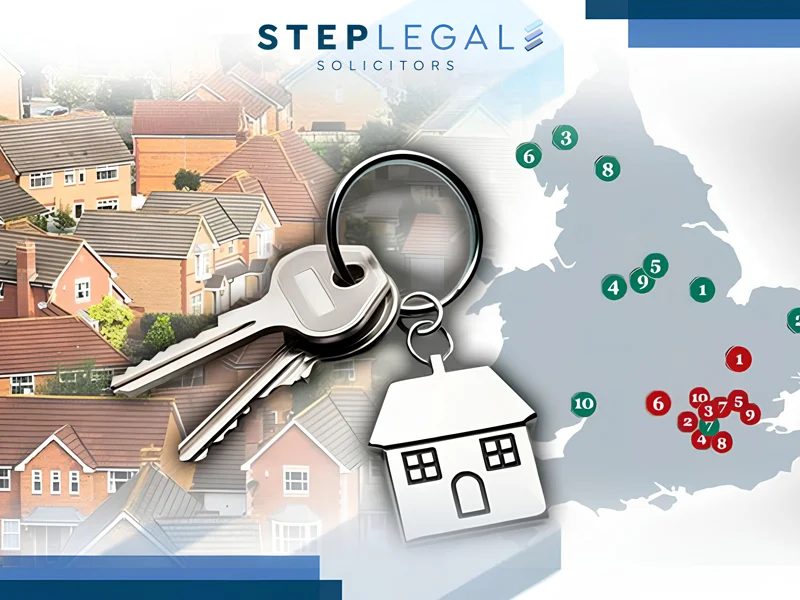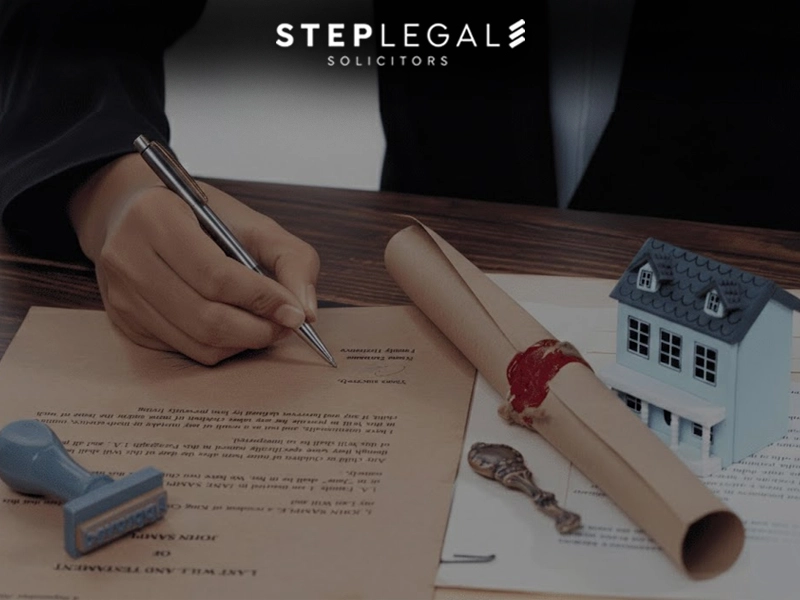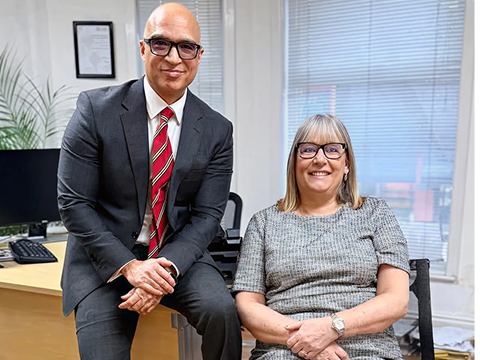
How to Buy a House in the UK
Buying a house in the UK is one of the biggest financial and personal milestones you can achieve. It’s an exciting step towards stability and independence, but for many buyers, especially first-time buyers, the process can also feel confusing. There are several stages to go through, from preparing your finances and saving a deposit to securing a mortgage, making an offer, arranging surveys, and finally completing all the legal conveyancing work before you collect your keys.
Understanding these steps in the right order makes the journey smoother and less stressful. This guide has been written to provide clear, practical information on how the home-buying process works in the UK. Whether you’re just starting to think about saving for a deposit or you’re already looking at properties, the aim of this article is to help you feel confident about what lies ahead.
We’ll explain what a mortgage in principle is, why appointing a conveyancing solicitor is essential, and what to expect at the key stages like the exchange of contracts and completion, alongside everything else you need to know. By the end, you’ll have a complete picture of what to do and when, making the process easier to plan for and much less overwhelming.
If you live in areas such as Stoke-on-Trent or Crewe, you’ll also find examples drawn from local property markets to show how these steps work in practice. Having supported many homebuyers through the conveyancing process, we know that with the right guidance, even the most complicated parts of buying a home can feel manageable.
Prepare Before You Start
Good preparation makes the whole process smoother. Before you begin looking at properties, take time to understand your finances and get organised. This means checking your credit score, reviewing your income and monthly commitments, and setting a clear budget.
It’s also useful to research the areas you might want to live in. Look at local amenities, schools, transport links, and community features. A clear idea of where you’d like to buy will save you time when it comes to house hunting.
Don’t forget to factor in additional costs such as solicitor’s fees, surveys, and moving expenses. Being realistic about your overall budget from the start helps avoid any unpleasant surprises later on.
Save Your Deposit
Your deposit is one of the most important parts of buying a home. The more you can save, the stronger your position will be when applying for a mortgage and negotiating with sellers.
For many buyers, especially first-time buyers, saving for a deposit can feel like the biggest challenge. Setting up a separate savings account, making use of government-backed schemes, and planning ahead are all effective ways to build your deposit over time.
Remember, having a larger deposit can give you access to better mortgage options, so every bit of extra saving counts.
Work Out How Much You Can Borrow
Once you’ve started saving, it’s time to understand how much you could realistically borrow from a lender. This helps you know what kind of properties are within your reach and prevents wasted time looking at homes outside your budget.
Lenders will assess your income, existing financial commitments, and credit history to decide how much they’re prepared to lend you. Online mortgage calculators can give a quick estimate, but for a clearer picture, it’s worth speaking to a mortgage broker. They can advise you on what’s realistic and help you find the right deals for your circumstances.
Get a Mortgage in Principle
A mortgage in principle is a statement from a lender confirming how much they might be willing to lend you. It’s not a guarantee, but it’s an important step because it shows estate agents and sellers that you’re a serious buyer.
Having this agreement in place before you start viewing properties gives you confidence and can make your offer more appealing to sellers. It usually lasts a couple of months, which gives you a good window of time to begin your search.
Start House Hunting
Now comes the exciting part – looking for your new home. You can begin your search online using property websites, but it’s also a good idea to register with local estate agents. In areas like Stoke-on-Trent and Crewe, where Step Legal is based, local knowledge can make a big difference in finding the right property.
When viewing homes, think about more than just the property itself. Consider the neighbourhood, travel connections, local schools, and any future development plans nearby.
Try to view the property more than once and at different times of the day to get a full picture.
Make an Offer
When you’ve found the right property, the next step is to make an offer. This is done through the estate agent, who will pass it on to the seller.
The seller might accept, reject, or negotiate your offer. Having a mortgage in principle in place and being clear about your position (for example, if you’re a first-time buyer or not part of a chain) can strengthen your chances.
Once your offer is accepted, the property is usually marked as “sold subject to contract”, which means the legal process can begin.
Appoint a Conveyancing Solicitor
At this point, you’ll need a solicitor to handle the legal side of the purchase, known as conveyancing. Your solicitor will make sure everything is in order, from checking legal documents and carrying out searches to transferring funds and registering your ownership with the Land Registry.
Choosing the right solicitor is crucial. At Step Legal, we pride ourselves on offering clear, transparent conveyancing services with no hidden fees. Our local expertise in Stoke-on-Trent and Crewe means we understand the area, the local authorities, and the processes involved, making your house purchase as smooth as possible.
Arrange a Survey
A property survey is an inspection carried out by a qualified surveyor. Its purpose is to highlight any issues with the home that might affect its value or require repairs. While a survey isn’t legally required, it’s strongly recommended.
Different types of surveys are available, from basic condition reports to more detailed structural surveys. The right choice depends on the property’s age, condition, and type. For example, older homes or those that have been significantly altered may benefit from a more detailed survey.
If your survey reveals issues, you may be able to renegotiate the price or ask the seller to fix problems before completion.
Apply for Your Mortgage
Even if you already have a mortgage in principle, you’ll now need to make a full mortgage application. This involves submitting detailed documents to your lender, such as proof of income, bank statements, and information about the property you’re buying.
Your lender will also carry out a valuation survey. This isn’t as detailed as a full property survey – it’s simply to confirm that the property is worth the price you’ve agreed to pay.
Once approved, you’ll receive a formal mortgage offer. This is a key milestone in the buying process and is usually valid for a set period of time, giving you and your solicitor time to complete the remaining steps.
Conveyancing and Legal Checks
Your solicitor will now carry out the legal work needed to transfer ownership of the property. This is known as conveyancing, and it’s one of the most important stages in buying a house.
Tasks your solicitor will handle include:
● Reviewing the draft contract
● Carrying out local authority, environmental, and water searches, among any other necessary searches
● Checking for any restrictions on the property
● Liaising with the seller’s solicitor to resolve questions
At Step Legal, our conveyancing team provides clear updates at every stage, so you always know what’s happening and what to expect next. This is especially important for first-time buyers, who may feel unsure about the process.
Exchange of Contracts
Once all the checks are complete and your mortgage offer is in place, you’ll reach the exchange of contracts. At this point, you and the seller sign identical contracts, which are then swapped between solicitors.
The exchange of contracts is legally binding. From this stage, you can no longer pull out without significant financial consequences. You’ll usually agree on a completion date at the same time.
Completion Day
Completion is the day you’ve been waiting for when the property legally becomes yours. On completion day, your solicitor will transfer the remaining funds to the seller’s solicitor. Once that happens, you’ll be able to collect your keys and move in.
For many buyers, completion day is emotional and exciting. It marks the end of the process and the beginning of a new chapter in your new home.
Property Search & Viewing Tips
Finding the right property isn’t just about falling in love with the way it looks. A house is a long-term investment, so it’s important to assess both the property itself and its surroundings carefully before making an offer.
What to Look for When Viewing a House
When you view a potential new home, it’s easy to focus on layout or decor, but the real value lies in spotting issues that may cause problems later.
● Structural issues: Look for cracks in walls, uneven floors, or signs of subsidence. These could signal expensive repairs.
● Damp and mould: Check around windows, ceilings, and skirting boards. Damp patches often suggest leaks or poor ventilation.
● Neighbourhood checks: Visit at different times of day to see traffic, noise, and safety levels. Local amenities, schools, and transport links all affect long-term value.
● Energy efficiency: Review the property’s EPC (Energy Performance Certificate). A home with better energy ratings will save you money on bills.
Freehold vs Leasehold: What’s the Difference?
Understanding whether a property is freehold or leasehold is crucial before buying.
● Freehold: You own both the property and the land it stands on. This usually gives you more freedom and fewer ongoing costs.
● Leasehold: You own the property for a fixed term but not the land. Leaseholders often pay ground rent and service charges and may need permission for certain alterations.
Leasehold properties are common with flats and some new builds. Always review the lease length carefully, as a short lease can affect both mortgage availability and future resale value.
New Build vs Older Homes: Pros and Cons
Should you buy a shiny new build or a character-filled older home? Both have advantages and drawbacks.
● New builds: Modern design, energy-efficient, and often come with warranties. However, they can be more expensive per square foot and may lack character.
● Older homes: Usually larger with established gardens and charm, but may require more maintenance or modernisation.
The choice depends on your lifestyle and budget. Some buyers prefer the hassle-free comfort of new builds, while others enjoy the uniqueness and space of older properties.
The Legal Side of House Buying
Buying a property in the UK isn’t only about choosing the right home and arranging a mortgage. The legal side of the process is just as important. This is where your conveyancing solicitor steps in to guide you through the paperwork, checks, and contracts that make your purchase secure.
What Does a Conveyancing Solicitor Actually Do?
A conveyancing solicitor manages all the legal aspects of your house purchase. Their role includes:
● Reviewing the draft contract prepared by the seller’s solicitor
● Ensuring the property’s title is valid and there are no disputes over ownership
● Checking for restrictions that could affect how you use the property
Liaising with your mortgage lender to confirm funds are in place
● Handling the transfer of money securely on completion day
In short, your solicitor makes sure everything is legally sound so you can buy with confidence. Without one, you risk missing key details that could cause problems later.
Property Searches Explained: What Are They, and Why Do They Matter?
Property searches are official checks carried out by your solicitor with the local authority and other bodies. They reveal important information about the property and the surrounding area. Common searches include:
● Local authority searches: Show planning permissions, road schemes, or restrictions affecting the property.
● Environmental searches: Highlight risks such as flooding, subsidence, or contamination.
● Water and drainage searches: Confirm connections to mains water and sewers.
These searches protect you from unexpected issues. For example, without them, you might discover too late that a motorway is planned nearby or that the house has a flooding history.
Understanding the Exchange and Completion Timeline
Two of the most important stages in the buying process are the exchange of contracts and completion.
● Exchange of contracts: At this point, the deal becomes legally binding. Both parties sign the contract, and you usually pay your deposit. Backing out after the exchange could mean losing your deposit.
● Completion: This is the final stage when the money is transferred, the property legally becomes yours, and you collect the keys.
The gap between exchange and completion can be days or weeks, depending on the circumstances. Your solicitor coordinates this timeline, making sure all legal requirements are met so you can move in without delays.
How Long Does It Take to Buy a House?
One of the most common questions buyers ask is: ‘How long does it take to buy a house in the UK?’
The answer varies depending on the property, the chain involved, and how quickly documents are processed. On average, the process from offer acceptance to completion takes around 8 – 12 weeks. However, it can be shorter or longer.
Factors that can delay the process include:
● Complicated property searches
● Delays in securing a mortgage offer
● Problems revealed in the survey
● Long property chains
Working with a proactive solicitor, like the conveyancing team at Step Legal, can help minimise delays and keep your purchase on track.
How Much Deposit Do I Need to Buy a House? Another common question is: ‘How much deposit do I need to buy a house in the UK?’
While the minimum requirement is often around 5% of the purchase price, many buyers aim to save more. A larger deposit can make it easier to secure a mortgage and may give you access to better interest rates.
It’s also important to remember that your deposit isn’t the only cost involved. You’ll need to budget for additional expenses like solicitor’s fees, surveys, and moving costs. By planning, you’ll avoid last-minute surprises and ensure your finances are in order.
How Much Do Solicitors Charge to Buy a House?
One of the key questions for any buyer is how much solicitors charge when purchasing a property. The cost of conveyancing depends on several factors, including the type of property, whether it is freehold or leasehold and the complexity of the transaction.
Solicitors typically charge either a fixed fee or a fee that scales with the value of the property. In addition to their legal fees, you’ll also need to cover “disbursements.” These are costs your solicitor pays on your behalf, such as Land Registry fees, searches, and bank transfer charges.
While fees vary, what matters most is transparency. A good solicitor will provide a clear breakdown at the start so you know exactly what to expect. This helps you budget effectively and ensures there are no hidden surprises later in the process.
How Long to Buy a House
The time it takes to buy a house can vary significantly. Some purchases are completed within a couple of months, while others may take longer, particularly if there are complications or a long property chain involved.
On average, buyers can expect the process to take between two and three months from the point an offer is accepted to completion. Factors that can affect this timeline include:
● The speed of mortgage approval
● The results of property searches
● How quickly are contracts reviewed and agreed
● Whether you’re part of a chain or buying a chain-free property
Although delays can happen, having a proactive solicitor and staying organised with paperwork can help keep everything on track.
How to Buy a House With No Deposit
Many people wonder if it’s possible to buy a house in the UK with no deposit at all. Traditionally, lenders require at least some form of deposit to reduce their risk. However, there are certain circumstances where buyers may be able to secure a home without putting down their own savings.
Options include:
● 100% mortgages: Rare, but some lenders may offer them if a family member provides a guarantee or uses their own property as security.
● Guarantor mortgages: A parent or close relative agrees to cover the repayments if you cannot.
● Government schemes: Some initiatives reduce the amount of deposit required, making it feel closer to “no deposit” in practical terms.
While these routes exist, they come with extra risks and responsibilities. It’s important to seek professional advice before pursuing this path to ensure it’s the right choice for your circumstances.
Why Choose Step Legal for Your House Purchase?
Buying a home isn’t just about finding the right property-it’s about making sure the entire process runs smoothly from start to finish. Having the right solicitor by your side can make all the difference.
At Step Legal, we specialise in conveyancing and have helped countless individuals and families successfully move into their new homes. With offices in Stoke-on-Trent and Crewe, we combine national expertise with local knowledge, ensuring your transaction is handled efficiently and with care.
What sets us apart?
● Transparent fees: No hidden costs, just clear and upfront pricing.
● Local expertise: Our familiarity with local councils, estate agents, and processes means fewer delays.
● Personal support: We guide you through each stage, explaining everything in plain language so you feel confident at every step.
● Trusted service: Our clients return to us time and again because of the reliable, professional service we deliver.
Conclusion
Buying a house in the UK may feel daunting at first, but with the right preparation and support, the process can be straightforward and even enjoyable. From saving your deposit and working out how much you can borrow, to arranging surveys, securing your mortgage, and finally collecting your keys, every step takes you closer to owning your dream home.
The most important thing to remember is that you don’t have to do it alone. With expert guidance from conveyancing specialists like Step Legal, you can navigate the journey with confidence, knowing that your purchase is in safe hands.
Whether you’re a first-time buyer or moving up the property ladder, our team in Stoke-on-Trent and Crewe is here to make the process as smooth and stress-free as possible.
Frequently Asked Questions
On average, it takes around 2–3 months from offer acceptance to completion, though delays can occur depending on mortgage approval, searches, and chains.
Most buyers need at least a small deposit, but having more saved can make mortgage approval easier and reduce monthly repayments.
Solicitor fees vary depending on the property and complexity. Costs include legal fees plus disbursements such as searches and Land Registry charges.
It’s rare but possible through certain schemes like guarantor mortgages or government-backed initiatives. Professional advice is recommended.
Step Legal offers transparent fees, local expertise in Stoke-on-Trent & Crewe, and personalised support to make buying your home stress-free.



![Tomlinson v Congleton Borough Council [2003]_ A Landmark Case in Understanding Risk, Responsibility and Agency in Personal Injury Claims](https://www.steplegal.co.uk/wp-content/uploads/2026/01/Tomlinson-v-Congleton-Borough-Council-2003_-A-Landmark-Case-in-Understanding-Risk-Responsibility-and-Agency-in-Personal-Injury-Claims.jpg)












